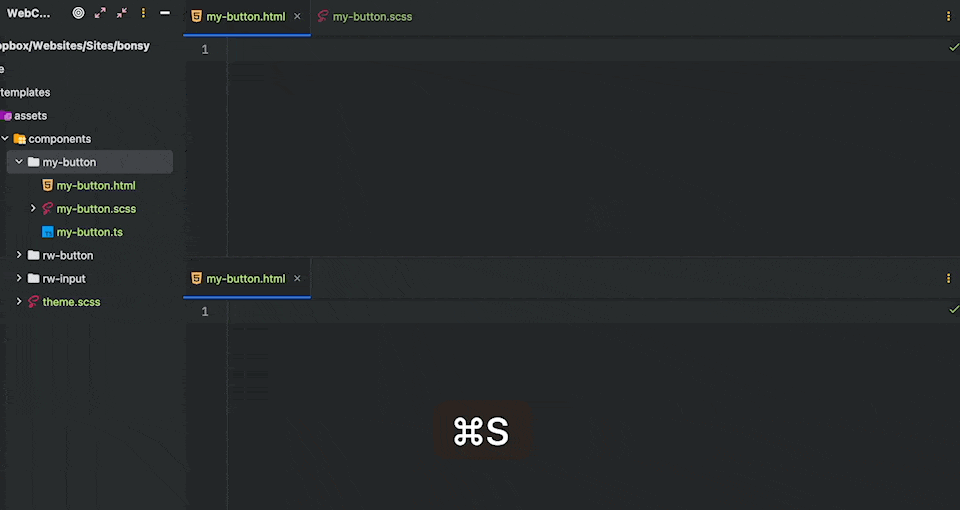csshtml-module
v1.5.6
Published
Easily compile CSS, HTML, or other files into modules for JavaScript or TypeScript
Downloads
44
Maintainers
Readme
Compile CSS and HTML to JavaScript modules
⚡ Easily compile CSS, HTML, or other files into ES6 modules for JavaScript or TypeScript ⚡
A simple CLI tool to let you use HTML and CSS files when developing Web Components.
Install
npm install -g csshtml-moduleWhy use this tool
There are currently no well-supported native way to import CSS and HTML to JavaScript. You can fetch these files, use compilers like Webpack and Rollup, or just put your code inside a JS file. But, you could also just let your IDE compile it automatically to native JS modules, which this CLI can help you with 😎
How it works
Set up your IDE to automatically trigger this CLI on changes made to HTML and CSS.
It can then convert files - like this button.css file 👇🏻
button {
background-color: red;
}into native modules in JavaScript or Typescript 👇🏻
// language=css
export const css: string = `button {
background-color: red;
}`;so you can import them wherever you need them 🔥
import {css} from './button.style.js'
const style = document.createElement('style');
style.innerHTML = css;There are even an option to compile CSS and HTML file to a ready template module for Web Components 🤘🏻
export const template = document.createElement('template');
template.innerHTML = `
<style>
button{ background-color: firebrick }
</style>
<button>🔥</button>
`;Learn more about this below 👇👇👇
How your IDE might help you 👌🏻
With an IDE like JetBrains PHPStorm you can set up File Watchers to automatically compile CSS and HTML to usable JavaScript modules with this CLI.
There should be an option to do this in VS Code as well (maybe you could help?).
Example on how this might look
- File Watchers (FW) in PHPStorm detects changes you made in your SCSS file.
- FW then compiles the file to CSS, Autoprefix it for better browser-support and minimize the file for faster loading.
- FW then use this CLI to compile your CSS to ES6 module.
So, you go from a SCSS file to ES6 module in seconds 🏎️💨
If you update your SCSS it will recompile and changes are instant.
➡️ Details on how to set up JetBrains File Watchers. ➡️ Details on how to set up VSCcode.
Example from PHPStorm

Usage
Single file compiling:
csshtml-module -i [inputFile] -o [outputFile]
HTML Template file compiling:
csshtml-module --template --css [file] --html [file] -o [template.ts]
Options:
-V, --version output the version number.
-i, --input <file> single file to convert - ignored if --template is set.
-o, --output <file> destination file. Should end with .ts or .js (required).
--template compiles to a HTMLTemplate module.
-d, --delay <int> time, in milliseconds, that the script should wait before compiling.
-n, --name <string> name of the JS constant - ignored if --template is set.
--html <string> html file to use for --template
--css <string> css file to use for --template
-h, --help display help for command
Convert single file to module
In terminal:
csshtml-module -i buttons.html -o buttons.html.ts --n ButtonHtmlWhich will convert your buttons.html file 👇🏻
<button type="submit" class="button">Save</button>Into this buttons.html.ts file 👇🏻
// language=html
export const ButtonHtml: string = `<button type="submit" class="button">Save</button>`;Which can be imported as a JS/TS module 👇🏻
import {ButtonHtml} from './buttons.html.ts'
const template = document.createElement('template');
template.innerHTML = ButtonHtml;Options
- It will compile either to JavaScript or TypeScript based on the output extension (
.jsor.ts) - It will add a
\\ language=file-extensioncomment to help you IDE understand the content. - If you want the compiler to wait for other compilers, you can define a
--delay. - You are not limited to
HTMLorCSS- but the output will be string.
Convert to HTML Template module
In terminal:
csshtml-module --template --css buttons.css --html buttons.html -o buttons.template.jsWhich will convert your buttons.html file 👇🏻
<button>Hello</button>And your buttons.css file 👇🏻
button { background-color: red }Into this buttons.template.js file 👇🏻
export const template = document.createElement('template');
template.innerHTML = `<style>button{background-color:red}</style><button>Hello</button>`;Which can be imported as a HTMLTemplate module 👇🏻
import {template} from './buttons.template.js'
...
this.shadowRoot.appendChild(template.content.cloneNode(true));Good to know
- Either CSS or HTML file must exist. If only CSS exist, it will still compile, but then only with a
styletag. - When you import the HTMLTemplate, it will be generated once, and not for every instance of your web component - like it would if you created the template inside the constructor/connectedCallback method.
Some thoughts on why this CLI tool was created
I wasn't able to find a satisfying solution to keep HTML and CSS as native, and separated, files when developing Web Components. I see other people want to keep these files separated as well.
I tried fetching, which I had problem accepting. I tried Webpack, but I found it to be slow and had too much configuration. I didn't try Rollup - because it didn't make sense in my environment.
There is a promising new feature for CSS module scripts, but this isn't well-supported for Safari (at least for now - in Feburary 2023). And the HTML module script is way too early.
Hopefully we will see this be implemented in browsers soon. Anyway, compiling down to a ready HTMLTemplate module that combines CSS and HTML does sound like a more performant solution.
With this CLI I can get performant code, compiled from native HTML and CSS files in matter of seconds. All ready to be used in the same instance.
Suggestions and help is welcomed!
Do you have any thoughts on how to achieve this in a more performant, faster or maybe in a well-supported native way? Then I would ❤️ to hear from you!
Please help if you can! Found any bugs or irregularities? Or maybe you are using VS Code and have found a way to automatically compile like I do in PHPStorm, then maybe you could share to help others?
Thanks for checking this out!
